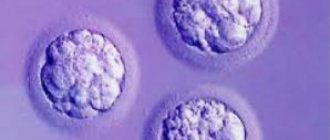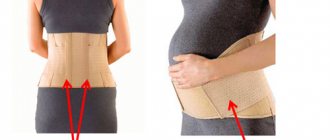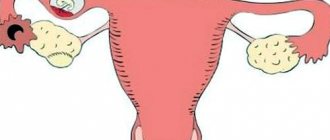What causes nagging pain in the lower abdomen during pregnancy?
Physiological reasons
Unpleasant sensations are natural in the early stages, since powerful hormonal changes are taking place, and the organs located in the pelvis are compressed and displaced. As a result, peristalsis is disrupted, intestinal colic and bloating appear.
Abdominal pain, like during menstruation, can occur at the very beginning of pregnancy, on the seventh day after conception. This means that the fertilized egg implants itself into the wall of the uterus.
Tugging sensations in different trimesters are caused by various physiological factors:
- sprain of the uterine ligaments;
- fetal growth and pressure on internal organs;
- training contractions.
If the condition does not worsen, there is no cause for concern.
Pathological causes
- Intense pain in the eighth week may be a sign of an ectopic pregnancy. It is accompanied by symptoms such as bleeding and a sharp deterioration in health.
- When your stomach feels tight during pregnancy, the threat of miscarriage cannot be ruled out. Signs of spontaneous abortion are pain in the form of contractions and spotting.
- Sometimes discomfort is caused by the child moving too actively. This is not always the norm: the fetus may suffer from oligohydramnios, lack of oxygen and other pathologies.
If pain and tingling in the lower abdomen are caused by complications during pregnancy, this always requires medical intervention, often emergency. Therefore, the expectant mother should be aware of the warning signs and be attentive to her condition.
Behavior of a woman with abdominal pain
Any symptoms caused by pathology of pregnancy or concomitant diseases of other organs require hospitalization and timely medical or surgical treatment. If it is determined that the pain is caused by physiological processes, then to reduce it, the pregnant woman must adhere to the following rules:
- do not overeat and exclude from the diet foods that increase gas formation, as well as obviously harmful foods;
- breathe fresh air every day by taking regular walks;
- Do not self-medicate, that is, do not take any medications or vitamin complexes without first consulting your doctor.
Abdominal pain, regardless of intensity or location, should alert every woman expecting a child. And it’s better to play it safe, appear funny in your fears and consult a doctor even with mild pain, than to waste time and expose your baby or yourself to serious consequences.
How to distinguish between physiological and pathological pain?
Discomfort, which is associated with natural causes, does not increase and does not prevent a woman from leading a normal lifestyle. After taking an antispasmodic or resting in a horizontal position, the condition usually improves.
You should be wary if the pain becomes intense and takes on a cramping character. Dangerous symptoms include:
- bloody issues;
- general malaise;
- decreased blood pressure;
- cardiopalmus;
- pre-fainting state.
It is important to know that the condition when the stomach is pulled during pregnancy can be caused by non-obstetric reasons. Diseases of the gastrointestinal tract, urinary system, and surgical pathologies cannot be excluded.
At a later date
In later stages, the load on a pregnant woman’s body increases, so pain in the abdominal area often increases. It is important not to self-medicate, but to contact your doctor with complaints.
In the second trimester
By the middle of the second trimester of pregnancy, the uterus enlarges so much that the muscles that support it begin to experience quite a lot of tension. It is often accompanied by pain, which intensifies with walking and physical activity. To reduce discomfort, doctors advise wearing a special bandage (2). However, it must be taken into account that it is selected individually after agreement with the attending physician.
Photo: @mart-production, pexels.com
In the third trimester
The third trimester is considered the most difficult - the growing belly increases the load on the spine and internal organs of the expectant mother. Often it is in the later stages that all chronic diseases become aggravated. Therefore, pain in the lower abdomen can be caused by reasons literally unrelated to pregnancy.
- Intestinal problems . — Almost all pregnant women experience constipation. To reduce their risk, you should monitor your water balance - drink enough water, eat more fiber - vegetables, fruits, whole grain bread. Also remember that it is better to eat in small portions and chew food as thoroughly as possible, says obstetrician-gynecologist Natalya Osokina.
- Appendicitis . Acute appendicitis, according to research by surgeons (3), most often occurs in pregnant women in the second trimester. Of course, in this case you cannot do without surgery. Appendicitis manifests itself not only with pain in the lower abdomen, but also with high fever. Vomiting and stool upset are also possible.
- Cystitis and urolithiasis . It is difficult not to recognize cystitis - it is signaled by pain during urination and frequent urge to go to the toilet. To diagnose the problem, sometimes it is enough to take a urine test.
— Even during pregnancy, extragenital diseases, such as pancreatitis, cholecystitis and others, can worsen. Most often, the pain will be localized, and nausea and vomiting may also occur. In such cases, it is worth contacting the nearest medical facility as quickly as possible, comments obstetrician-gynecologist Natalya Osokina .
At 37 weeks
Often pain in the lower abdomen at 37 weeks can be normal. The body is preparing for childbirth, sometimes by this time the expectant mother’s stomach has already dropped, which is accompanied by unpleasant sensations. Also, from the 37th week, training contractions usually appear - the stomach becomes toned and hardens. As a rule, training contractions do not last long and the frequency of them is not traced. However, it is worth considering that the cause of pain may be more serious, so it is better to consult your doctor.
Photo: @freestocksorg, pexels.com
At 38 weeks
By the 38th week, most women experience training contractions that provoke mild pain in the lower abdomen. The reasons discussed above remain relevant. Perhaps it's time to start monitoring your diet more carefully so as not to put unnecessary strain on your body.
At 39 weeks
— A baby at 39 weeks is usually ready for birth. Precursors of labor may also appear. Also remember that the load on the muscles and ligaments of the uterus is maximum during this period, so pain in the lower abdomen may occur with a sudden change in body position. They soon go away on their own and do not require the use of medications, says obstetrician-gynecologist Natalya Osokina.
At 40 weeks
At 40 weeks, the expectant mother can no longer wait to meet her baby, so almost any discomfort in her health is perceived as a possible onset of labor. Labor contractions are, of course, accompanied by abdominal pain, but they are quite easy to recognize - the pain gradually increases, and the time between contractions decreases.
What to do if there is pain in the lower abdomen during pregnancy?
Only a doctor can find out the cause of discomfort. The Polyclinic+1 clinic has experienced gynecologists with extensive experience. They will examine you, clarify your complaints, refer you for tests, and, if necessary, for a consultation with a specialist. Based on the results of the examination, a gentle but effective treatment regimen will be drawn up.
If the cause of the pain is physiological, we will give recommendations on normalizing lifestyle and nutrition, and prescribe symptomatic therapy. In any case, you will get rid of fears about the fact that the lower abdomen pulls during pregnancy.
The article was checked for compliance with medical standards by a leading specialist at the Polyclinic+1 clinic, a dermatovenerologist, urologist, and mycologist.
Malashenko Vladimir Alexandrovich
Pain not related to pregnancy
If the lower abdomen constantly pulls and hurts during pregnancy, then it is necessary to exclude the exacerbation or development of diseases not related to the growth of the baby. Non-obstetric pain can be caused by:
- Infections that are sexually transmitted.
- Inflammatory diseases of the kidneys and urinary system - cystitis, pyelonephritis. With these pathologies, not only does the lower abdomen feel tight, but the body temperature also rises, there is discomfort when urinating, the urine becomes cloudy, and blood can be seen in it.
- Inflammatory diseases of the reproductive system - external genitalia, vagina, ovaries, fallopian tubes, cervical canal.
- Problems with the digestive system. Nausea, heartburn, constipation, diarrhea or bloating are common pregnancy companions that can annoy a woman from the first week. If a pregnant woman is diagnosed with acute or chronic gastrointestinal pathologies, then she needs to undergo a special course of treatment, in consultation with an obstetrician-gynecologist. If the problems are caused only by the development of the embryo, then it will be enough for the young mother to reconsider her lifestyle and diet.
- Inflammation of the appendix. Accompanied by nausea and increased body temperature. The pain can be concentrated in the right side, the navel area, and radiate to the iliac region. If the diagnosis is confirmed, emergency surgery is performed, which does not have a negative impact on the health of the unborn child and the further development of pregnancy.
- In rare cases, a pregnant woman may develop intestinal obstruction, which is also an indication for emergency surgery. Characteristic signs of the pathology are loss of appetite, bloating (often asymmetrical), cramping pain, fecal retention, and repeated vomiting.
What to do if your lower abdomen hurts a lot
You should not self-medicate and try traditional methods for severe pain in the lower abdomen. The only correct way in this case is to immediately consult a doctor. If bleeding occurs, you must call an ambulance. While waiting for doctors, it is better to lie down, calm down and try to normalize your breathing.
It is important to know
Discharge during pregnancy: which ones you can ignore and which ones you should see a doctor about
First signs of pregnancy - 1 week
Expectant mothers immediately need to remember that there are two views on the duration of pregnancy: obstetric and embryonic.
We are talking about 1 week of pregnancy after conception, that is, the embryonic period. Doctors usually operate in obstetrics, where the last day of menstruation is taken as the starting point. To get an obstetric period from the embryonic period, you need to add two weeks. That is, the first week of pregnancy after conception corresponds to the third obstetric week. At this stage, the restructuring of the woman’s body has just begun. Very few lucky women notice the first signs of pregnancy in the first week.
“Some women may feel pregnant even in the first week after conception, but these are usually few,” explains obstetrician -gynecologist Dina Absalyamova . — I am inclined to believe that a more psychological factor plays a role here, although the pregnancy hormone, human chorionic gonadotropin (hCG), may also have an influence. It is produced by a fertilized egg.
Sensitive women may notice that their mood and taste preferences begin to change. Among the signs of pregnancy in the first week, some even note toxicosis, but it usually appears after a couple of weeks.
Belly photo
Belly at 1 week of pregnancy.
Photo: Andrey Arkusha, globallookpress.com In the first week of pregnancy from conception, your figure remains the same. The fetus is still too small for the mother's belly to become noticeable. The zygote, formed by an egg and a sperm, divides quickly, but not enough: into 2 cells, 4, 8, and so on up to 32 cells. Accordingly, a photo of the abdomen at 1 week of pregnancy is not indicative.
The fetus in the first week of pregnancy is called an embryo; it actually becomes a fetus only in the sixth week.
In the meantime, the embryo is in a small sac with liquid and is nourished not from the mother, but from the yolk sac. The size of the unborn baby at this stage is approximately 0.1–0.2 mm. Considering how small it is, no one can guess from a photo of the belly at 1 week of pregnancy about the interesting position of the woman.
Delay of menstruation
The most obvious early sign of pregnancy and the reason for most women to buy a test is a missed period. But not all delays indicate pregnancy. The reason for this may be hormonal imbalance or diseases associated with the reproductive system, rapid weight gain or loss.
In addition, some women experience bleeding during pregnancy. You should ask your doctor about this so you know when blood is normal and when it is a sign of an emergency.
Breast changes
Signs such as breast changes usually appear first. Serious changes and hormonal changes begin immediately after conception. The body is preparing for lactation. The structure of breast tissue changes. After a few weeks you may feel tingling and pain.
Although a significant change in growth is not yet noticeable, the breasts begin to swell, become heavier, fuller, and the areola area may darken. In addition, the nipples become very sensitive. Even a slight touch can cause discomfort.
There are other reasons that affect changes in the mammary glands: from normal weight gain to menstruation. But, in the case of pregnancy, you just need to endure this difficult period. Over time, you will be able to get used to these sensations and changes in the body. Later, the pain, sensitivity and discomfort in the chest should subside.
Causes of pain after conception
The causes of pain spreading in the lower abdomen after conception can be due to both hormonal changes occurring in the body and the presence of pathology. To understand why pain occurs, it is necessary to understand how the fertilization process occurs.
After maturation and rupture of the follicle, the egg begins its movement through the fallopian tubes. It is during this period - sometimes later, when it has almost reached the uterus - that it meets the sperm that fertilizes it. A week after fertilization, the resulting zygote is fixed in the uterine cavity and begins its development.
Some women report experiencing distinct pain as the fertilized egg attaches to the wall of the uterus. This is a short, but quite noticeable pain. Sometimes the moment of implantation is accompanied by light bleeding: a few drops of blood appear on the underwear.
Can my stomach hurt after conception? As gynecological practice shows, yes. Many women report mild pain and tingling in the uterus. But the main sign of pregnancy is the absence of monthly bleeding.
The reason why the stomach hurts after conception is uterine contractions. The woman’s body perceives the attached fertilized egg as a foreign element and tries to get rid of the “invader”. The woman experiences nagging pain.
Preservation of pregnancy helps to weaken the immune defense under the influence of hormones responsible for the development of gestation. Thanks to this, the fertilized egg is fixed more and more firmly and begins active development.
Menstrual cramps
After fertilization, the egg attaches to the endometrium of the uterus. This can cause slight bleeding and cramping pain in the lower abdomen, which is one of the earliest signs of pregnancy. This bleeding is called implantation bleeding, since at this time the egg is implanted into the uterine mucosa. The attachment period takes place in the first 6-12 days after conception. The symptom is often confused with menstruation. However, the spasms are less pronounced.
In addition to blood, a woman may notice heavy vaginal discharge. They look like white milk clots. The fact is that at the same time, the unborn child begins its development at the cellular level. Thickening of the vaginal walls begins. Increased cell growth occurs, which provokes these discharges.
This sign can accompany a girl throughout her pregnancy. The discharge is usually harmless and does not require any treatment. But if you feel an unpleasant odor, burning and itching, you need to contact a gynecologist so that he can determine whether you have a fungal or bacterial infection. Remember that the disease can harm not only you, but also the child. Untimely treatment poses a threat to the life and health of the unborn baby.
How to check pregnancy at 1 week
It is almost impossible to check pregnancy at 1 week. The changes in the body are too small for tests or an ultrasound machine to detect. To get convincing evidence that you are pregnant, you need to wait until at least the 7th, and preferably the 10th, day of pregnancy, when particularly sensitive tests can already show the coveted two stripes.
Tests
At 1 week of pregnancy, a test may show a questionable result Photo: Bernhard Classen, globallookpress.com
A test in the first week of pregnancy will either give you nothing or show a questionable result. Too little time has passed since conception for changes to become noticeable.
“If you take a regular pharmacy test in the first week of pregnancy, where you need to urinate on a strip, it will probably give you a negative result - the period is too short,” explains gynecologist Dina Absalyamova . — The same problem will occur with the hCG analysis. Fluctuations in the level of human chorionic gonadotropin will be so small that the results will be regarded as doubtful.
As a result, the expectant mother can only wait until the pregnancy period exceeds 10 days and the tests become more reliable.
Ultrasound
At 1 week of pregnancy, ultrasound is not indicative.
Photo: Ottfried Schreiter, globallookpress.com Don’t rush to get an ultrasound scan. In the first week of pregnancy, ultrasound is not indicative; even the most modern equipment is not able to visualize the embryo.
As a rule, ultrasound at such an early stage is recommended for those women who experience symptoms specific to an ectopic pregnancy. It can be dangerous, therefore, to exclude such a diagnosis, a gynecologist may prescribe an ultrasound diagnosis.
Those girls who hope to get the first pictures of their unborn child will have to wait until 2-3 weeks.
Find out more
2nd week of pregnancy: what happens to the body
Do all women experience early pregnancy symptoms?
Every woman is unique in nature. Therefore, it is impossible to determine the same symptoms for everyone; everything happens quite individually. And sometimes it happens that for the same woman, one pregnancy is significantly different from another.
In addition, early symptoms are very often similar to the period before and after menstruation. Some signs of pregnancy can be mistaken for your period. Thus, the girl may not even realize that she is pregnant.
It is worth noting that you cannot refer only to the signs, because they can indicate completely different reasons. Sometimes even a test can give an erroneous result, so you can hear the most accurate answer at an appointment with an uzist.
first signs of pregnancy









